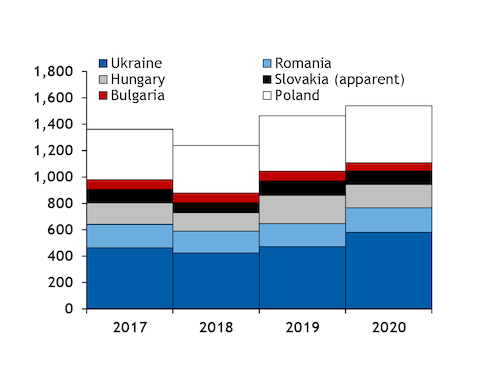Ukraine's gas consumption increased in May from a year earlier, as unseasonably cool weather and stronger power sector gas burn more than offset low industrial demand.
Aggregate demand rose to 55.5mn m³/d from 45.1mn m³/d in May 2019. Consumption had also been up from a year earlier in April and in March, but not by as much as last month (see data and download).
Cool weather boosted demand (see graph). Average overnight temperatures in Kyiv of 8.9°C were well below the seasonal norm of 12°C and the 12.6°C in May 2019.
And stronger power sector gas burn also lifted aggregate demand.
Low prices across central and eastern Europe have led to more extensive fuel switching across the region, including in countries such as Hungary, and even in traditionally coal-dominant countries like Poland. Ukraine has been similar, with several gas-fired units de-mothballed last month. The country has seven gas-fired plants — with a total maximum capacity of 5.4GW — most of which have not operated in the past five years as gas prices were uncompetitive with coal. Utilisation increased considerably in May before Ukraine's government advanced plans to prioritise coal. A regulatory order, which has only a recommendatory effect, came into force on 18 June and will run until 1 November. This could lead to gas use in electricity generation falling once again.
High heating demand and power sector consumption more than offset weak industrial gas burn, with the effect of the Covid-19 pandemic on economic activity still strongly apparent. Data from nearly 20 oblast-level distributors owned by Regional Gas Company (RGK) show that industrial gas demand in May fell by 7.2mn m³/d, or about 66pc, from a year earlier. Industrial gas use had been down only slightly in April, and had been up on the year in February-March (see table).
| RGK consumption | mn m³ | |||||||||
| Sector | May 20 | May 19 | Apr 20 | Apr 19 | Mar 20 | Mar 19 | Feb 20 | Feb 19 | Jan 20 | Jan 19 |
| Budget organisations | 1.3 | 1.9 | 7.9 | 11.8 | 33.0 | 43.4 | 52.2 | 56.2 | 56.0 | 64.8 |
| Households | 253.2 | 144.9 | 423.1 | 356.4 | 630.5 | 736.9 | 814.0 | 918.6 | 71.1 | 1,198.4 |
| Industry | 380.2 | 342.2 | 365.4 | 375.5 | 502.8 | 479.2 | 591.0 | 492.5 | 518.3 | 637.6 |
| Power sector | 117.6 | 42.7 | 192.5 | 141.9 | 463.2 | 495.4 | 568.7 | 578.0 | 652.1 | 752.9 |
| Total | 752.3 | 531.7 | 988.8 | 885.6 | 1,629.5 | 1,754.9 | 2,025.9 | 2,045.4 | 1,297.5 | 2,653.6 |
| — RGK | ||||||||||



